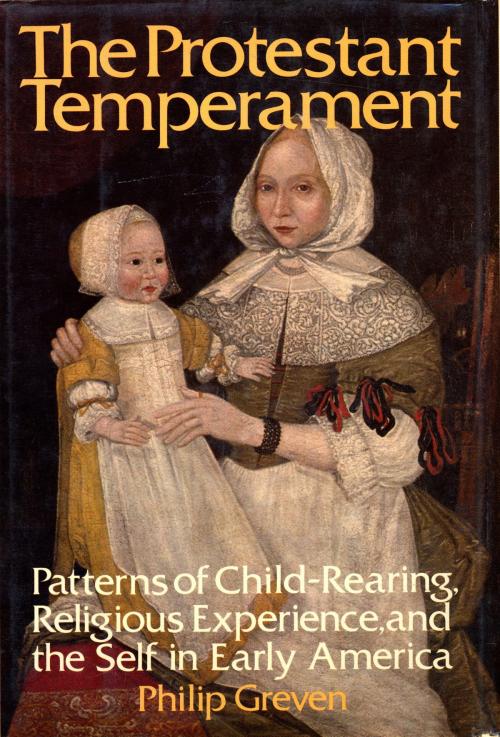The Protestant Temperament
Nonfiction, History, Americas, United States, Colonial Period (1600-1775), Health & Well Being, Psychology, Child & Adolescent, Child Development, Revolutionary Period (1775-1800)| Author: | Philip J. Greven, Jr. | ISBN: | 9780307831347 |
| Publisher: | Knopf Doubleday Publishing Group | Publication: | September 4, 2013 |
| Imprint: | Knopf | Language: | English |
| Author: | Philip J. Greven, Jr. |
| ISBN: | 9780307831347 |
| Publisher: | Knopf Doubleday Publishing Group |
| Publication: | September 4, 2013 |
| Imprint: | Knopf |
| Language: | English |
Bringing together an extraordinary richness of evidence—from letters, diaries, and other intimate family writing of the 17th and 18th centuries—Philip Greven, the distinguished scholar of colonial history explores the strikingly distinctive ways in which Protestant children were reared, and the Protestant temperament shaped, in America.
Through this cache of remarkable and remarkably immediate and moving material – the family papers of some of America’s most famous theologians, political figures, lawyers, and ministers as well as those of lesser-known contemporaries (farmers, merchants, housewives) who embodied Protestant life and wrote about it most expressively—Philip Greven traces the hidden continuities of religious experience, of attitudes toward God, children, the will, the body, sexuality, achievement, pleasure, virtue, and selfhood among the three Protestant groups of the time. He examines, in turn, the three strains that persisted regardless of denomination. First, the “evangelicals” (their dictum for raising children: “Break their wills that you may save their souls”), ruled by a hostility to the self, a feeling that selfhood is the source of sin, too dangerous to be sought or desired (Jonathan Edwards wrote: “I have been before God and have given myself, all that I am, and have, to God; so that I am not, in any respect, my own . . . I have given myself clear away”). And we hear the products of this upbringing, in their twenties and thirties, speaking of themselves in the harshest tones (“My affections carnal, corrupt, and disordered”), distrusting themselves in the most profound ways (a woman faced with the choice of a husband wrote: “I dare not decide myself and dread nothing more than to be left to the Bent of my own heart”).
In counterpoint, we see the “moderates,” poised between duty and personal desire, preoccupied but not obsessed with morality, more interested in self-control than self-suppression (an eminent Unitarian, the Reverend Theodore Parker of Boston, wrote: “The will needs regulation, not destroying. I should as soon think of breaking the legs of a horse in training him, as a child’s will”).
And, finally, we see the “genteel” in polite society, taking their state of grace for granted, more interested in self-assertion than self-control, completely at ease with ambition and worldliness—music, dancing, games, convivial drinking, hunting, and sports all an integral part of the children’s lives as they grow into maturity; the boys groomed for social responsibility, the girls encouraged to be “steady, studious, docile, with a mild and winning presence, a sweet, obliging temper . . . ”
The Protestant Temperament uncovers the personal experience and the psychological and social effects of religion and piety in the American of the 17th and 18th centuries, the feelings as well as the beliefs of religious people. Fascinating and groundbreaking in its revelations and its radical reassessment of the role of religion in early American life, Philip Greven’s book is a major intellectual event, an important and illuminating interpretation of the American Protestant experience.* *
Bringing together an extraordinary richness of evidence—from letters, diaries, and other intimate family writing of the 17th and 18th centuries—Philip Greven, the distinguished scholar of colonial history explores the strikingly distinctive ways in which Protestant children were reared, and the Protestant temperament shaped, in America.
Through this cache of remarkable and remarkably immediate and moving material – the family papers of some of America’s most famous theologians, political figures, lawyers, and ministers as well as those of lesser-known contemporaries (farmers, merchants, housewives) who embodied Protestant life and wrote about it most expressively—Philip Greven traces the hidden continuities of religious experience, of attitudes toward God, children, the will, the body, sexuality, achievement, pleasure, virtue, and selfhood among the three Protestant groups of the time. He examines, in turn, the three strains that persisted regardless of denomination. First, the “evangelicals” (their dictum for raising children: “Break their wills that you may save their souls”), ruled by a hostility to the self, a feeling that selfhood is the source of sin, too dangerous to be sought or desired (Jonathan Edwards wrote: “I have been before God and have given myself, all that I am, and have, to God; so that I am not, in any respect, my own . . . I have given myself clear away”). And we hear the products of this upbringing, in their twenties and thirties, speaking of themselves in the harshest tones (“My affections carnal, corrupt, and disordered”), distrusting themselves in the most profound ways (a woman faced with the choice of a husband wrote: “I dare not decide myself and dread nothing more than to be left to the Bent of my own heart”).
In counterpoint, we see the “moderates,” poised between duty and personal desire, preoccupied but not obsessed with morality, more interested in self-control than self-suppression (an eminent Unitarian, the Reverend Theodore Parker of Boston, wrote: “The will needs regulation, not destroying. I should as soon think of breaking the legs of a horse in training him, as a child’s will”).
And, finally, we see the “genteel” in polite society, taking their state of grace for granted, more interested in self-assertion than self-control, completely at ease with ambition and worldliness—music, dancing, games, convivial drinking, hunting, and sports all an integral part of the children’s lives as they grow into maturity; the boys groomed for social responsibility, the girls encouraged to be “steady, studious, docile, with a mild and winning presence, a sweet, obliging temper . . . ”
The Protestant Temperament uncovers the personal experience and the psychological and social effects of religion and piety in the American of the 17th and 18th centuries, the feelings as well as the beliefs of religious people. Fascinating and groundbreaking in its revelations and its radical reassessment of the role of religion in early American life, Philip Greven’s book is a major intellectual event, an important and illuminating interpretation of the American Protestant experience.* *















